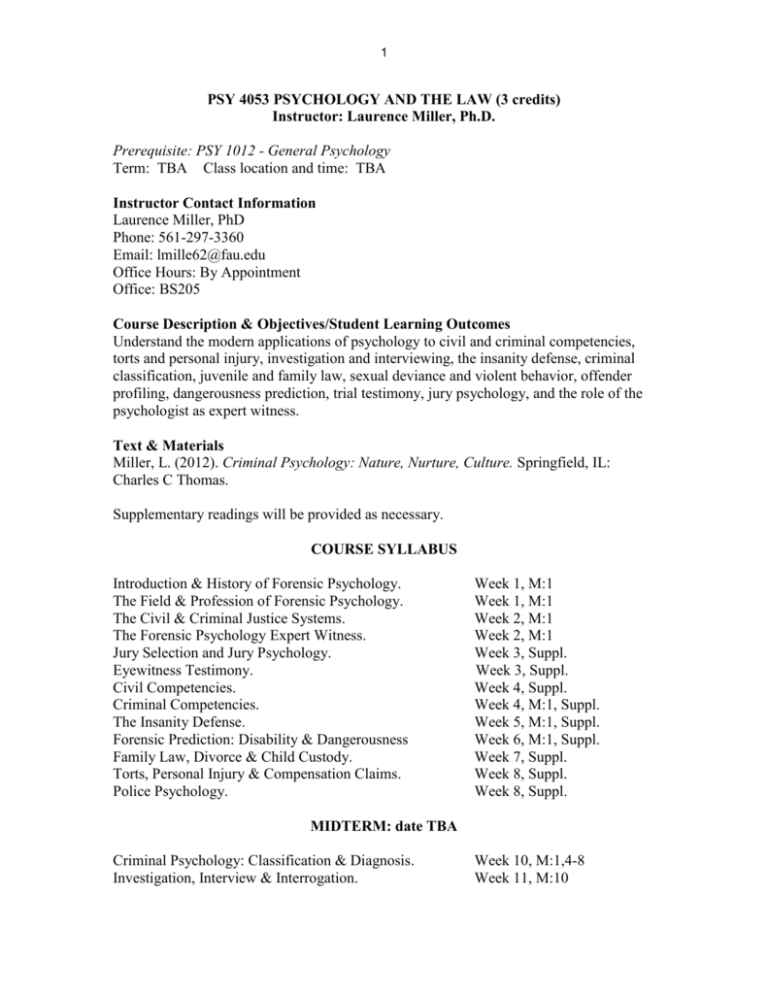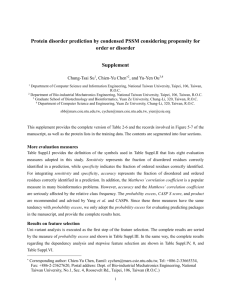syllabus - Florida Atlantic University
advertisement

1 PSY 4053 PSYCHOLOGY AND THE LAW (3 credits) Instructor: Laurence Miller, Ph.D. Prerequisite: PSY 1012 - General Psychology Term: TBA Class location and time: TBA Instructor Contact Information Laurence Miller, PhD Phone: 561-297-3360 Email: lmille62@fau.edu Office Hours: By Appointment Office: BS205 Course Description & Objectives/Student Learning Outcomes Understand the modern applications of psychology to civil and criminal competencies, torts and personal injury, investigation and interviewing, the insanity defense, criminal classification, juvenile and family law, sexual deviance and violent behavior, offender profiling, dangerousness prediction, trial testimony, jury psychology, and the role of the psychologist as expert witness. Text & Materials Miller, L. (2012). Criminal Psychology: Nature, Nurture, Culture. Springfield, IL: Charles C Thomas. Supplementary readings will be provided as necessary. COURSE SYLLABUS Introduction & History of Forensic Psychology. The Field & Profession of Forensic Psychology. The Civil & Criminal Justice Systems. The Forensic Psychology Expert Witness. Jury Selection and Jury Psychology. Eyewitness Testimony. Civil Competencies. Criminal Competencies. The Insanity Defense. Forensic Prediction: Disability & Dangerousness Family Law, Divorce & Child Custody. Torts, Personal Injury & Compensation Claims. Police Psychology. Week 1, M:1 Week 1, M:1 Week 2, M:1 Week 2, M:1 Week 3, Suppl. Week 3, Suppl. Week 4, Suppl. Week 4, M:1, Suppl. Week 5, M:1, Suppl. Week 6, M:1, Suppl. Week 7, Suppl. Week 8, Suppl. Week 8, Suppl. MIDTERM: date TBA Criminal Psychology: Classification & Diagnosis. Investigation, Interview & Interrogation. Week 10, M:1,4-8 Week 11, M:10 2 Crime Scene Analysis & Offender Profiling. Psychology & Neuropsychology of Violent Crime. Homicide, Serial Homicide & Mass Homicide. Sexual Assault & Sex Crimes. Family Violence & Child Abuse. Juvenile Crime & the Juvenile Justice System. Forensic Psychology in the School & Workplace. Other Crimes and Syndromes. Corrections, Treatment, and Rehabilitation. Victimology & Victim Services. Special Topics. Week 11, M:10 Week 12, M:2,3 Week 12, M:9,10 Week 13, M:14,15 Week 13, M:16,17 Week 14, M:19 Week 14, M:11,12 Week 15, M:18,20 Week 15, CK:16,17, M:21 Week 16, M:21 Week 16, Supplementary FINAL: date TBA Course Requirements This course involves 50 minutes of in-class instruction for each credit hour per week. To master the material covered in this course it is expected that the student will spend a minimum of two hours per week per credit hour on textbook study and review of class notes. There are no additional assignments. Course material in this class is based on the text, lecture notes, and class discussion. The weekly topic schedule may change somewhat, depending on the progress of the class, so it is the student’s responsibility to keep current. Therefore, you are highly encouraged to attend each and every class and to take careful notes. If you cannot attend a class, you are encouraged to make arrangements with a fellow student(s) to cover that day’s notes for you. Class participation in discussions is welcome but not required. Course Evaluation Method Midterm Exam: 50% of grade. FinalExam: 50% of grade. Course Grading Scale A = 90-100 B+ = 85-89 B = 80-84 C+ =75-79 C =70-74 D+ =65-69 D = 60-64 F = <60 Minus grades (e.g. B-, C-) may be given at the instructor’s discretion, usually if the average of the midterm and final is on the borderline between two letter grades, but there is evidence of significant improvement from the first test to the second (e.g. M=70, F=88, average=79, grade=B-). 3 To receive a grade for this course you must take both the midterm and final exams on the dates they are given. There are no make-ups or extra credit assignments. In certain circumstances (e.g. documented medical emergency), special considerations may be made. Bring a blue Scantron with you to each exam and be sure you know how to fill it out correctly. Reasonable accommodation will be made for students participating in a religious observance or in University-approved activities, including athletic or scholastics teams, musical and theatrical performances and debate activities. Other special requests are at the discretion of the instructor. Disability Policy Statement In compliance with the Americans with Disabilities Act (ADA), students who require special accommodation due to a disability to properly execute coursework must register with the Office of Students with Disabilities (OSD) – in Boca Raton, SU 133 (561-2973880); in Davie MOD 1 (954-236-1222); in Jupiter, SR 117 (561-799-8585); or at the Treasure Coast, CO 128 (772-873-3305) – and follow all OSD procedures. Code of Academic Integrity Policy Statement Students at Florida Atlantic University are expected to maintain the highest ethical standards. Academic dishonesty is considered a serious breach of these ethical standards, because it interferes with the university mission to provide a high quality education in which no student enjoys an unfair advantage over any other. Academic dishonesty is also destructive of the university community, which is grounded in a system of mutual trust and places high value on personal integrity and individual responsibility. Harsh penalties are associated with academic dishonesty. For more information, see University regulation 4.001 at http://www.fau.edu/regulations/chapter4/4.001_Code_of_Academic_Integrity.pdf




